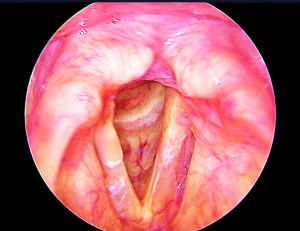Introduction
Change of voice is commonly due to a condition called Laryngitis.
Laryngitis is a common ailment that affects people of all ages and backgrounds. It is an inflammation of the voice box or Larynx, which can lead to hoarseness or even a temporary loss of voice. In this comprehensive guide, we will explore laryngitis, examining its causes, symptoms, and effective treatments. Dr. Meenesh Juvekar, a distinguished ENT specialist from Mumbai, will provide invaluable insights into managing this condition.Causes of Laryngitis or change of voice
Laryngitis can be triggered by various factors, including:1. Infections
a. Viral Infections:
The most common cause of voice change is viral infection, often associated with the common cold or the flu. These viruses can inflame the vocal cords, leading to voice changes.b. Bacterial Infections:
While less common, bacterial infections by bacteria like Streptococcus can also cause bacterial laryngitis.2. Irritants
a. Excessive Voice Use:
Overuse or straining of the voice through activities like shouting, singing, or loud speaking can irritate the larynx and cause voice changes and hoarseness.2. Gastroesophageal Reflux Disease (GERD):
a. Excessive Voice Use:
Stomach acid refluxing into the throat can cause chronic swelling of the voice boxl, as the acid irritates and damages the vocal cords over time.Symptoms of Laryngitis
Common symptoms of laryngitis are1. Change,hoarseness or Loss of Voice
Hoarseness of voice is the commonest symptom most patients will suffer. This is often accompanied by throat irritation or sore throat.2. Cough
A persistent, dry cough may develop due to throat irritation and frequency of increased clearing the throat.3. Mild Fever
In cases of infectious laryngitis, a mild fever may be present. Treatment of hoarseness of voice Common symptoms of laryngitis areTreatment of hoarseness of voice
While most cases of laryngitis are self-limiting and resolve within a few days, there are several effective strategies for managing the condition:1. Voice Rest:
Dr. Meenesh Juvekar emphasizes that voice rest is a crucial for patients with Laryngitis Avoid speaking, singing, or whispering as much as possible to give your vocal cords time to heal. Resting your voice means using it as little as possible for a few days or until symptoms improve.
2. Hydration:
Staying well-hydrated is crucial. Drinking plenty of water helps keep the throat moist, soothes irritation, and thins mucus. Warm liquids like tea with honey can provide additional relief.
3. Avoiding Irritants:
Avoid irritants like smoking, alcohol, caffeine, and exposure to allergens or pollutants that can worsen symptoms.
3. Humidifying the Air:
Using a humidifier in your room can help maintain optimal moisture levels, preventing further throat irritation.
Tests for Hoarseness of Voice of Laryngitis :
At Juvekars Nursing Home we have the advanced Voice Lab to cater to the problems of voice faced by everyone especially professional voice users 70 Degree Hopkins Laryngoscopy gives us an Idea of the condition of the voice box and the any local swelling etc along with movements of the vocal cords Stroboscopy: This is an advanced test done by Dr Meenesh Juvekar at Juvekars Nursing Home. This test demonstrates the movements and the vibrational properties of the vocal cords, especially the vocal wave form pattern or any growth or any other condition. Stroboscopic picture of the Vocal Cords
Dr. Meenesh Juvekar suggests that any change or hoarseness of voice more than 1 week time must surely be investigated and treated especially if the symptoms increase of persist along with breathing difficulty or fever.
Stroboscopic picture of the Vocal Cords
Dr. Meenesh Juvekar suggests that any change or hoarseness of voice more than 1 week time must surely be investigated and treated especially if the symptoms increase of persist along with breathing difficulty or fever.
